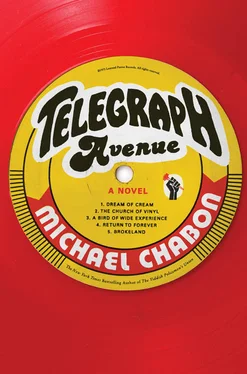“He said we’re fucked. Seriously, why are you holding a baby?”
Archy looked down at Rolando English, a rusty young man with a sweet mouth and soft brown ringlety curls all sweaty and stuck to the side of his head, stuffed into a blue onesie, then wrapped in a yellow cotton blanket. Archy hefted Rolando English and heard a satisfying slosh from inside. Rolando English’s mother, Aisha, was a daughter of the King of Bling. Archy had offered to take Rolando off Aisha’s hands for the morning, maybe pick up a few items the baby required, and so forth. Archy’s wife was expecting their first child, and it was Archy’s notion that, given the imminence of paternity, he might get in some practice before the first of October, their due date, maybe ease the shock of finding himself, at the age of thirty-six, a practicing father. So he and Rolando had made an excursion up to Walgreens, Archy not at all minding the walk on such a fine August morning. Archy dropped thirty dollars of Aisha’s money on diapers, wipes, formula, bottles, and a package of Nuk nipples—Aisha gave him a list—then sat down right there on the bus bench in front of the Walgreens, where he and Rolando English changed themselves some foul-smelling diaper, had a little snack, Archy working his way through a bag of glazed holes from the United Federation of Donuts, Rolando English obliged to content himself with a pony of Gerber Good Start.
“This here’s Rolando,” Archy said. “I borrowed him from Aisha English. So far he doesn’t do too much, but he’s cute. Now, Nat, I gather from one or two of your previous statements that we are fucked in some manner.”
“I ran into Singletary.”
“And he gave you some insight.”
Nat spun the crate of records he had carried in with him, maybe thirty-five, forty discs in a Chiquita crate, started idly flipping through them. At first Archy assumed Nat was bringing them in from home, items from his own collection he wanted to sell, or records he had taken home for closer study, the boundaries among the owners’ respective private stocks and the store’s inventory being maintained with a careless exactitude. Archy saw that it was all just volunteers. A Juice Newton record, a bad, late Commodores record, a Care Bears Christmas record. Trash, curb fruit, the bitter residue of a yard sale. Orphaned record libraries called out constantly to the partners from wherever fate had abandoned them, emitting a distress signal only Nat and Archy could hear. “The man could go to Antarctica,” Aviva Roth-Jaffe once said of her husband, “and come back with a box of wax 78s .” Now, hopeless and hopeful, Nat sifted through this latest find, each disc potentially something great, though the chances of that outcome diminished by a factor of ten with each decrease in the randomness of the bad taste of whoever had tossed them out.
“‘Andy Gibb,’” Nat said, not even bothering to freight the words with contempt, just slipping ghosts of quotation marks around the name as if it were a known alias. He pulled out a copy of After Dark (RSO, 1980) and held it up for Rolando English’s inspection. “You like Andy Gibb, Rolando?”
Rolando English seemed to regard the last album released by the youngest Gibb brother with greater open-mindedness than his interlocutor.
“I’ll go along with you on the cuteness,” Nat said, his tone implying that he would go no further than that, like he and Archy had been having an argument, which, as far as Archy could remember, they had not. “Give him.”
Archy passed the baby to Nat, feeling the cramp in his shoulder only after he had let go. Nat encircled the baby under the arms with both hands and lifted him, going face-to-face, Rolando English doing a fine job of keeping his head up, meeting Nat’s gaze with that same air of willingness to cut people a break, Andy Gibb, Nat Jaffe, whomever. Nat’s humming turned soft and lullaby-like as the two considered each other. Baby Rolando had a nice, solid feel to him, a bunch of rolled socks stuffed inside one big sock, dense and sleepy, not one of those scrawny flapping-chicken babies one ran across from time to time.
“I used to have a baby,” Nat recalled, sounding elegiac.
“I remember.” That was back around the time he first met Nat, playing a wedding at that Naturfreunde club up on Joaquin Miller. Archy, just back from the Gulf, came in at the last minute, filling in for Nat’s regular bassist at the time. Now the former Baby Julius was fifteen and, to Archy at least, more or less the same sweet freakazoid as always. Hearing secret harmonies, writing poetry in Klingon, painting his fingernails with Jack Skellington faces. Used to go off to nursery school in a leotard and a tutu, come home, watch Color Me Barbra . Even at three, four years old, prone like his father to holding forth. Telling you how french fries didn’t come from France or German chocolate from Germany. Same tendency to get caught up in the niceties of a question. Lately, though, he seemed to spend a lot of time transmitting in some secret teenager code, decipherable only by parents, designed to drive them out of their minds.
“Babies are cool,” Nat said. “They can do Eskimo kisses.” Nat and Rolando went at it, nose to nose, the baby hanging there, putting up with it. “Yeah, Rolando’s all right.”
“That’s what I thought.”
“Got good head control.”
“Doesn’t he, though?” Archy said.
“That’s why they call him Head-Control Harry. Right? Sure it is. Head-Control Harry. You want to eat him.”
“I guess. I don’t really eat babies all that much.”
Nat studied Archy the way Archy had studied the A-side of the late Bob Benezra’s copy of Kulu Sé Mama (Impulse!, 1967), looking for reasons to grade it down.
“So, what, you practicing? That the idea?”
“That was the idea.”
“And how’s it working out?”
Archy shrugged, giving it that air of modest heroism, the way you might shrug after you had been asked how in God’s name you managed to save a hundred orphans trapped in a flaming cargo plane from collision with an asteroid. As he played it off to Nat, Archy knew—felt, like the baby-shaped ache in his left arm—that neither his ability nor his willingness to care for Rolando English for an hour, a day, a week, had anything whatsoever to do with his willingness or ability to be a father to the forthcoming child now putting the finishing touches on its respiratory and endocrine systems in the dark laboratory of his wife’s womb.
Wiping a butt, squeezing some Carnation through a nipple, mopping up the milk puke with a dishrag, all that was mere tasks and procedures, a series of steps, the same as the rest of life. Duties to pull, slow parts to get through, shifts to endure. Put your thought processes to work on teasing out a tricky time signature from On the Corner (Columbia, 1972) or one of the more obscure passages from The Meditations (Archy was currently reading Marcus Aurelius for the ninety-third time), sort your way one-handed through a box of interesting records, and before you knew it, nap time had arrived, Mommy had come home, and you were free to go about your business again. It was like the army: Be careful, find a cool dry place to stash your mind, and hang on until it was over. Except, of course (he realized, experiencing the full-court press of a panic that had been flirting with him for months, mostly at three o’clock in the morning when his wife’s restless pregnant tossing disturbed his sleep, a panic that the practice session with Rolando English had been intended, vainly, he saw, to alleviate), it never would be over. You never would get through to the end of being a father, no matter where you stored your mind or how many steps in the series you followed. Not even if you died. Alive or dead or a thousand miles distant, you were always going to be on the hook for work that was neither a procedure nor a series of steps but, rather, something that demanded your full, constant attention without necessarily calling on you to do, perform, or say anything at all. Archy’s own father had walked out on him and his mother when Archy was not much older than Rolando English, and even though, for a few years afterward, as his star briefly ascended, Luther Stallings still came around, paid his child support on time, took Archy to A’s games, to Marriott’s Great America and whatnot, there was something further required of old Luther that never materialized, some part of him that never showed up, even when he was standing right beside Archy. Fathering imposed an obligation that was more than your money, your body, or your time, a presence neither physical nor measurable by clocks: open-ended, eternal, and invisible, like the commitment of gravity to the stars.
Читать дальше
Конец ознакомительного отрывка
Купить книгу












